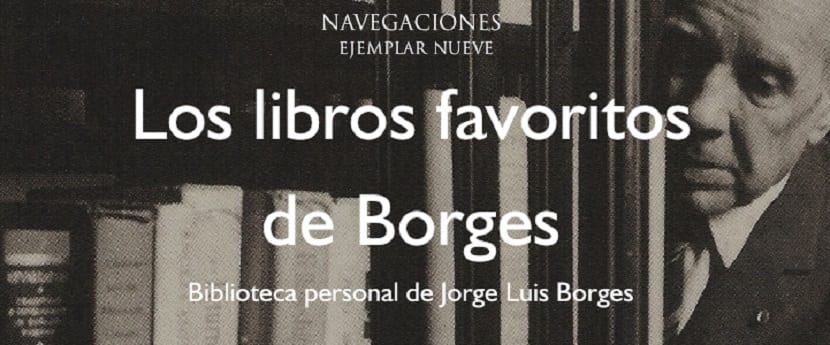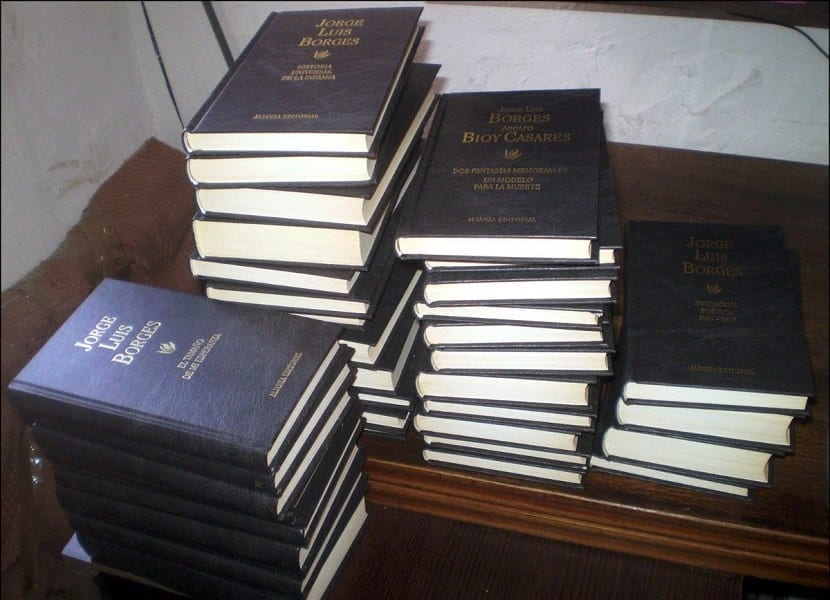In 1985, the Argentine publishing house Hyspamérica, published what would be Borges' personal library. This library would include the 74 books recommended by Borges, who once read them, fascinated the Argentine author so much that he wanted to openly recommend them to all lovers of literature.
Borges himself was in charge of making the prologues to these 74 titles. He wanted to get to 100, but unfortunately in 1988, he died of liver cancer.
In this selection of books, Borges did not follow any type of parameter, but it was a totally disparate list, which he only wanted to share with everyone. Some of his words were:
Let others boast of the books they have been given to write; I boast of those that I was given to read… I wish this library to be as diverse as the unsatisfied curiosity that has led me, and continues to lead me, to the exploration of so many languages and so many literatures. "
Borges personal library
- Julio Cortazar: "Stories"
- "Apocryphal Gospels"
- Franz Kafka: "America" and Short Stories
- Gilbert Keith Chesterton: "The blue cross and other stories"
- Maurice Maeterlinck: "The intelligence of flowers"
- Dino Buzzati: "The desert of the Tartars"
- Henry Ibsen: "Peer Gynt", "Hedda Glaber"
- Jose Maria Eca de Queiroz: "The Mandarin"
- Leopold Lugones: "The Jesuit Empire"
- Andre Gide: "The fake purses"
- Herbert George Wells: "The time Machine" y "The invisible man"
- Robert Graves: "The Greek myths"
- Fyodor Dostoevsky: "The demons"
- Edward Kasner & James Newman: «Mathematics and imagination»
- Eugene O'Neill: "The Great God Brown" y "Strange interlude"
- Hermann Melville: "Benito Cereno", "Bily Budd" y "Bartleby, the clerk"
- Giovanni Papini: "The daily tragic", "The blind pilot" y "Words and blood"
- Arthur Machen: "The three impostors"
- Friar Luis de Leon: "Song of songs" y "Exhibition of the Book of Job"
- Joseph Conrad: "Heart of Darkness" y "With the rope around the neck"
- Oscar Wilde: "Essays and dialogues"
- Henri Michaux: "A barbarian in Asia"
- Herman Hesse: "The game of the abalors"
- Enoch A. Bennett: "Buried alive"
- Claudius Eliano: «History of animals»
- Thorstein Veblen: "Theory of the Leisure Class"
- Gustave Flaubert: "The Temptations of Saint Anthony"
- Marco Polo: "The description of the world"
- Marcel Schwob: "Imaginary lives"
- George Bernard Shaw: "Caesar and Cleopatra", "The Commander Barbar" y "Candida"
- Francis Quevedo: «La Fortuna with brains and everyone's time» y "Mark Gross"
- Eden Philpotts: "The Redmayne Reds"
- Soren Kierkegaard: "Fear and trembling"
- Gustav Meyrink: "The Golem"
- Henry James: "The teacher's lesson", "Private life" y "The figure on the carpet"
- Herodotus: "The nine books of history"
- Juan Rulfo: "Pedro Paramo"
- Rudyard Kipling: "Stories"
- Daniel Defoe: "Moll Flanders"
- Jean Cocteau: "Professional secrecy and other texts"
- Thomas deQuincey: "The last days of Emmanuel Kant and other writings"
- Ramon Gomez de la Serna: «Prologue to the work of Silverio Lanza»
- Antonine Galland: "Arabian Nights" (selection)
- Robert Louis Stevenson: "The new Arab nights"
- Leon Bloy: "Salvation by the Jews", «The blood of the poor» y "In the darkness"
- Bhagavad Gita. "Poem of Gilgamesh"
- Juan Jose Arreola: "Fantastic tales"
- David Garnett: «From lady to fox», "A man at the zoo" y «Return of the sailor»
- Jonathan Swift: "Gulliver's Travels"
- Paul Grousac: "Literary criticism"
- Manuel Mujica Lainez: "The idols"
- John Ruiz: «Book of good love»
- William Blake: "Complete poetry"
- Hugh walpole: «In the dark square»
- Ezequiel Martinez Estrada: «Poetic work»
- Edgar Allan Poe: "Stories"
- Publius Virgil Maron: "The Aeneid"
- Voltaire: "Stories"
- J.W Dunne: "An experiment with time"
- Attilio Momigliano: "Essay on Orlando Furioso"
- William James: "The varieties of religious experience" y "Study on human nature"
- Snorri Sturluson: «Saga of Egil Skallagrimsson»
If you want to read these prologues click here. There are a total of 72 pages where Borges gives more than reasons for reading these books. If you are a faithful follower of this writer and his work, you cannot stop reading this brief Borges biography in which we review both the life and literary career of the Buenos Aires author.
Borges's Prologue to "Tales" by Edgar Allan Poe
As an example and anticipation, we leave you the prologue that Borges wrote to the Tales written by the master of terror, Edgar Allan Poe. Enjoy it!
Today's literature is inconceivable without Whitman and without Poe. It is difficult for us to imagine two more diverse people, except that each man is diverse. Edgar Poe was born in 1809 in Boston, a city he would later abhor. Orphan at two years old, he was adopted by a merchant, Mr. Allan, whose last name was his middle name. He grew up in Virginia and was always known from the South. He was educated in England. A monument of his long stay in that country is the description of a school with such curious architecture that one never knows what floor it is on. In 1830 he entered the West Point Military Academy, from which he was expelled for his fondness for gambling and drinking. Aggressive and neurotic in nature, he was nevertheless a hard worker and has left us five generous volumes of prose and verse. In 1835 he married Virginia Clemm, who was thirteen years old. As a poet, he is less appreciated in his homeland than in other parts of the world. His famous poem "The Bells" led Emerson to nickname him the jingle man. He fell out with all his colleagues; he absurdly accused Longfellow of plagiarism. When he was called a disciple of the German romantics, he replied: 'Horror does not come from Germany; it comes from the soul. He always abounded in "sound self-pity" and his style is interjective. Drunk, he died in the common room of a Baltimore hospital. In delirium he repeated the words he had put into the mouth of a sailor who died, in one of his first stories, on the edge of the South Pole. In 1849 he and the sailor died together. Charles Baudelaire translated all his work into French and prayed to him every night. Mallarmé consecrated a famous sonnet to him. From a single tale of his dating from 1841, "The Murders in the Rue Morgue," which appears in this volume, comes the entire detective genre: Robert Louis Stevenson, William Wilkie Collins, Arthur Conan Doyle, Gilbert Keith Chesterton, Nicholas Blake, and so many others. From his fantastic literature let us remember "The Facts in the Case of Mr. Valdemar" "A Descent into the Maelström", "The Pit and the Pendulum", "Ms. Found in a Bottle ”and“ The Man of the Crowd ”all of unheard of invention. In "The Philosophy of Composition" the great romantic declares that the performance of a poem is an intellectual operation, not a gift of the muse.


Thank you for this gem!!!